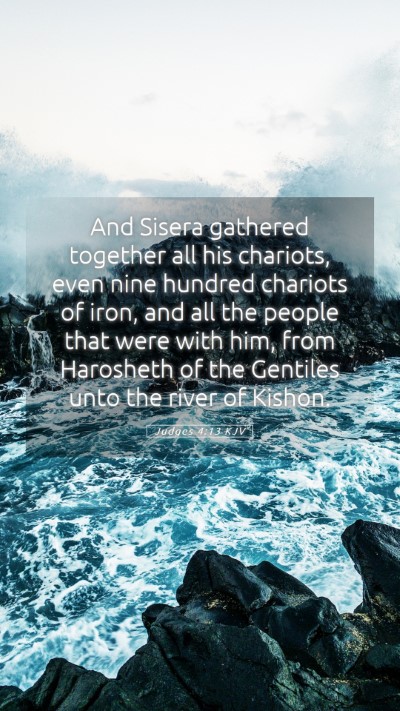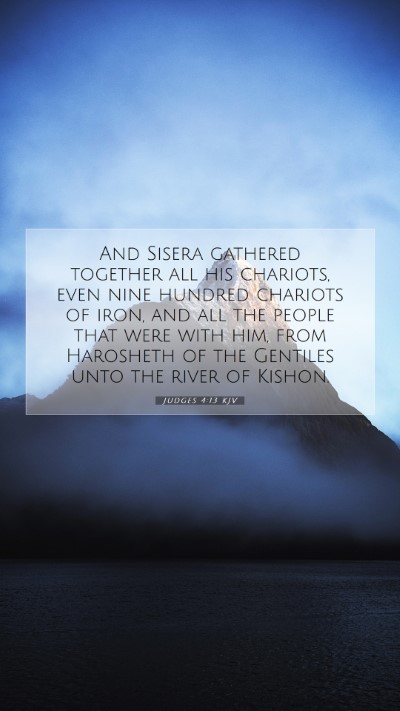Old Testament
Genesis Exodus Leviticus Numbers Deuteronomy Joshua Judges Ruth 1 Samuel 2 Samuel 1 Kings 2 Kings 1 Chronicles 2 Chronicles Ezra Nehemiah Esther Job Psalms Proverbs Ecclesiastes Song of Solomon Isaiah Jeremiah Lamentations Ezekiel Daniel Hosea Joel Amos Obadiah Jonah Micah Nahum Habakkuk Zephaniah Haggai Zechariah MalachiJudges 4:13 Meaning
What is the meaning of Judges 4:13?
And Sisera gathered together all his chariots, even nine hundred chariots of iron, and all the people that were with him, from Harosheth of the Gentiles unto the river of Kishon.
Judges 4:13 Bible Verse Meaning
Analysis and Commentary on Judges 4:13
Verse Reference: Judges 4:13
In this passage, we witness a critical moment in the narrative of Israel's deliverance. The verse states:
“And she sent and called Barak the son of Abinoam out of Kedeshnaphtali, and said unto him, Hath not the Lord God of Israel commanded, saying, Go and draw toward mount Tabor, and take with thee ten thousand men of the children of Naphtali and of the children of Zebulun?”
Understanding the Context
This verse occurs during a time of turmoil for the Israelites, who were oppressed by Jabin, the king of Canaan. Deborah, a prophetess and judge, calls Barak, indicating divine authority and initiating a military campaign.
- Historical context: Israel was suffering due to disobedience and was under Canaanite oppression.
- Key figures: Deborah is not only a leader but also a spiritual guide, underscoring the importance of hearing God's voice.
- Mount Tabor: This location is significant for its strategic advantage in battle.
Bible Verse Interpretations
The interpretations of Judges 4:13 from various commentaries reveal profound insights into the narrative:
Matthew Henry's Commentary
Henry emphasizes the critical role of Deborah as a leader empowered by God, pointing out that her call to Barak confirms the divine mandate for battle. Barak's response to her summons indicates a unique collaboration between prophetic leadership and military action. This denotes the biblical principle that true leadership must be rooted in divine guidance.
Albert Barnes' Commentary
Barnes highlights the importance of obedience to God's command. He asserts that the message from Deborah to Barak was a reminder of God’s prior instructions, showcasing the ongoing covenant between God and Israel. This reinforces the necessity of preparing for spiritual and physical battles under God’s direction.
Adam Clarke's Commentary
Clarke elaborates on the specifics of Barak’s heritage and its implications in Israel's history. He contextualizes Barak's fears and emphasizes how Deborah’s certainty reflects the unwavering power of God, encouraging readers to trust in Divine Assurance, especially in overwhelming circumstances.
Theological Insights
The passage teaches about the importance of recognizing God’s voice in leadership and decision-making. Deborah’s role as a female judge challenges societal norms and underscores God’s radical inclusiveness. The text also exemplifies the themes of:
- Divine calling: God's will manifests through human leaders.
- Faith and action: Barak's mobilization of troops reflects faith responding actively to divine commands.
- Victory through obedience: The eventual success of Israel’s forces can be attributed to adherence to God’s directives.
Application of the Verse
For contemporary readers, Judges 4:13 serves as a powerful reminder of the necessity of being attuned to divine leadership. It poses essential questions about our responses to God's commands:
- How can we discern God's voice in our lives today?
- What actions are we called to take in our communities in response to divine direction?
- In what ways can we support and elevate others in their leadership roles amidst challenges?
Conclusion
Judges 4:13 encapsulates profound themes of divine leadership, obedience, and empowerment. It encourages believers to actively seek God's guidance and remain faithful to His calls, which leads to spiritual and communal victories.
Related Bible Cross References
- Hebrews 11:32-34 - Reference to Barak’s faith.
- Judges 5:1-3 - The song of Deborah celebrates God's victory.
- 1 Samuel 12:11 - Call for leadership in times of distress and God’s deliverance.


